It is inspiring to read the newly released Africa39 list of the most promising writers
from Africa under 40 years old and see so many
writers who have been involved in the Caine Prize process recognised on that
list.
 On 8th April 2014, at a breakfast at the London Book Fair, 39 writers from Africa south of the Sahara and its diaspora were
revealed as the authors selected as the Africa39. Also
announced was that the official
anthology of their work, edited by former deputy
editor of Granta,
and Deputy Chairperson of the Caine Prize, Ellah
Wakatama Allfrey, will be published in October 2014.
On 8th April 2014, at a breakfast at the London Book Fair, 39 writers from Africa south of the Sahara and its diaspora were
revealed as the authors selected as the Africa39. Also
announced was that the official
anthology of their work, edited by former deputy
editor of Granta,
and Deputy Chairperson of the Caine Prize, Ellah
Wakatama Allfrey, will be published in October 2014.
The “39 Project” aims to celebrate the most vibrant voices in
literature and provides a platform to expand the conversation about the
future of literature in Africa. The Africa39 Project,
as part of the Port Harcourt (UNESCO World Book Capital 2014) Book Fair, will
culminate in the publication of an anthology featuring new writing by selected
writers from Africa, jointly published by the Hay Festival, the Rainbow BookClub, and Bloomsbury. Across the world, and from 2014 to 2016, a series of events will
seek to showcase the Africa39 authors,
their work, and the Africa39 anthology.
How was the Africa39 list compiled?
 In November 2013, Binyavanga Wainaina—2002 Caine Prize winner, founder of Kenya-based
literary journal, Kwani?, and author of acclaimed memoir, One Day I Will Write About This Place—took on the task of researching and compiling a list of
120 writers from Sub-Saharan Africa for the Africa39 Project. This long-list
was sent to the official judges (Margaret Busby, Elechi Amadi, Osonye
Tess Onwueme) who then decided upon a short-list of 39. For one month
Binyavanga and his team worked to issue calls to Anglo-, Franco-, Lusophone,
and Kiswahili literary writers and to publicise the project across Africa.
In November 2013, Binyavanga Wainaina—2002 Caine Prize winner, founder of Kenya-based
literary journal, Kwani?, and author of acclaimed memoir, One Day I Will Write About This Place—took on the task of researching and compiling a list of
120 writers from Sub-Saharan Africa for the Africa39 Project. This long-list
was sent to the official judges (Margaret Busby, Elechi Amadi, Osonye
Tess Onwueme) who then decided upon a short-list of 39. For one month
Binyavanga and his team worked to issue calls to Anglo-, Franco-, Lusophone,
and Kiswahili literary writers and to publicise the project across Africa.
 In November 2013, Binyavanga Wainaina—2002 Caine Prize winner, founder of Kenya-based
literary journal, Kwani?, and author of acclaimed memoir, One Day I Will Write About This Place—took on the task of researching and compiling a list of
120 writers from Sub-Saharan Africa for the Africa39 Project. This long-list
was sent to the official judges (Margaret Busby, Elechi Amadi, Osonye
Tess Onwueme) who then decided upon a short-list of 39. For one month
Binyavanga and his team worked to issue calls to Anglo-, Franco-, Lusophone,
and Kiswahili literary writers and to publicise the project across Africa.
In November 2013, Binyavanga Wainaina—2002 Caine Prize winner, founder of Kenya-based
literary journal, Kwani?, and author of acclaimed memoir, One Day I Will Write About This Place—took on the task of researching and compiling a list of
120 writers from Sub-Saharan Africa for the Africa39 Project. This long-list
was sent to the official judges (Margaret Busby, Elechi Amadi, Osonye
Tess Onwueme) who then decided upon a short-list of 39. For one month
Binyavanga and his team worked to issue calls to Anglo-, Franco-, Lusophone,
and Kiswahili literary writers and to publicise the project across Africa.
Early on, Binyavanga emphasised that the places
on the long-list must be apportioned equitably according to gender. Also
important to the project were those authors writing in African languages. In outlining “The Spirit of the Africa39 Project”, Binyavanga made
provisions for writers who might be “at risk” or who, for reasons of safety or
security, publish anonymously or using pseudonyms. He ensured that as many
different types of writers were encouraged to submit including, “[w]riters of
children’s fiction, prose fiction blogs, erotica writers, romance,” as well
those who have published “writing done in Braille.” The resulting long-list was
as diverse as possible, reflective of the complexity of the continent, and
populated with “the wild, weird, [African] explorers of the imagination.”
Which Caine Prize writers feature on the Africa39 list?
The 17 authors involved with the Caine Prize, either by taking part in a workshop, as a shortlisted writer, or as a winner of the Prize include:
 Chimamanda Ngozi Adichie from Nigeria was shortlisted in 2002 for her story "You in America" and took part in the first Caine Prize workshop in South Africa in 2003 where she wrote the story "Lagos, Lagos" which was published in Discovering Home.
Chimamanda Ngozi Adichie from Nigeria was shortlisted in 2002 for her story "You in America" and took part in the first Caine Prize workshop in South Africa in 2003 where she wrote the story "Lagos, Lagos" which was published in Discovering Home.
Monica Arac de Nyeko from Uganda was shortlisted in 2004 for her story "Strange
Fruit", and went on to win the Caine Prize in
2007 for "Jambula
Tree". She took part in the 2005 workshop in Kenya where she wrote the
story "Grasshopper Redness" published in Seventh Street Alchemy and the 2008 workshop in South Africa
where she wrote the story "Night Commuter" published in Jambula Tree and other stories.

Rotimi Babatunde from Nigeria won the Caine Prize in 2012 for his short story "Bombay's Republic" and took part in the 2013 workshop in Uganda where he wrote "Howl" which was published in A Memory This Size and other stories.
Jackee Budesta Batanda from Uganda took part in the 2005 workshop in Kenya where she wrote the story "Life Sucks...Sometimes" which was published in Seventh Street Alchemy.

Shadreck Chikoti from Malawi took part in the 2011 workshop in Cameroon where he wrote the story "Child of a Hyena" which was published in To See the Mountain and other stories.
Tope Folarin won the 2013 Caine Prize for his short story "Miracle" published in Transition magazine.
Clifton Gachagua from Kenya took part in the 2014 workshop in Zimbabwe where he wrote the story "As a Wolf Sweating your Mother's Body" which will be published in the Caine Prize anthology in July this year.
Mehul Gohil from Kenya attended the workshop in South Africa in 2012 where he wrote the story "Elephants Chained to Big Kennels" published in African Violet and other stories.
 Abubakar Ibrahim from Nigeria was shortlisted in 2013 for his story "The Whispering Trees". He took part in the Uganda workshop in 2013 where he wrote "The Book of Remembered Things" which was published in A Memory This Size and other stories and the Zimbabwe workshop in 2014 where he wrote the story "Lily in the Moonlight" which will be published in the Caine Prize anthology in July this year.
Abubakar Ibrahim from Nigeria was shortlisted in 2013 for his story "The Whispering Trees". He took part in the Uganda workshop in 2013 where he wrote "The Book of Remembered Things" which was published in A Memory This Size and other stories and the Zimbabwe workshop in 2014 where he wrote the story "Lily in the Moonlight" which will be published in the Caine Prize anthology in July this year. Stanley Kenani from Malawi was shortlisted 2012 & 2008 for his stories "Love on Trial" and "For Honour". He took part in the 2013 workshop in Uganda where he wrote the story "Clapping Hands for a Smiling Crocodile", published in A Memory This Size and other stories and the 2010 workshop in Kenya where he wrote the story "Happy Ending" published in A Life in Full and other stories.
Stanley Kenani from Malawi was shortlisted 2012 & 2008 for his stories "Love on Trial" and "For Honour". He took part in the 2013 workshop in Uganda where he wrote the story "Clapping Hands for a Smiling Crocodile", published in A Memory This Size and other stories and the 2010 workshop in Kenya where he wrote the story "Happy Ending" published in A Life in Full and other stories. 
Glaydah Namukasa from Uganda attended the Caine Prize Naivasha workshop in 2007 where she wrote her short story, "Then, Now and Tomorrow" which was published in Jungfrau. Glaydah is the current Chairperson of FEMRITE, the Uganda Women Writer's Association.

Nii Parkes from Ghana has been a member of the Caine Prize council for three years. He was the workshop leader for the 2014 workshop in Zimbabwe along with 2008 Caine Prize winner Henrietta Rose-Innes.
Namwali Serpell from Zambia was shortlisted in 2010 for her story "Muzungu" and took part in the 2011 workshop in Cameroon where she wrote the story "The Man with the Hole in his Face" which was published in To See the Mountain and other stories.

Novuyo Rose Tshuma from Zimbabwe took part in the 2010 workshop in Kenya where she wrote the story "The King and I" which was published in A Life in Full and other stories.
 |
Chika Unigwe from Nigeria was shortlisted in 2004 for her story "The Secret" and took part in the 2005 workshop in Kenya where she wrote the story "Retail Therapy" which was published in Seventh Street Alchemy.

Mary Watson from South Africa won the Caine Prize in 2006 for her story "Jungfrau" and took part in the 2007 workshop in Kenya where she wrote the story "Simon Said" which was published in the Jungfrau collection.



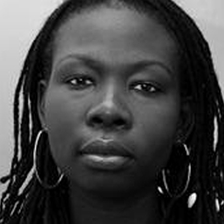
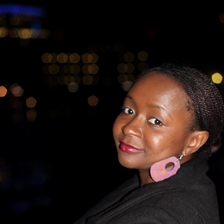

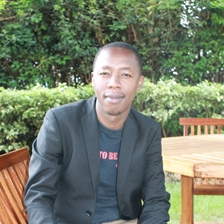
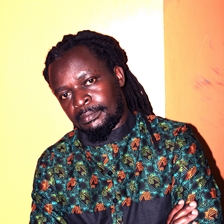

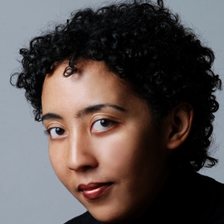
No comments:
Post a Comment